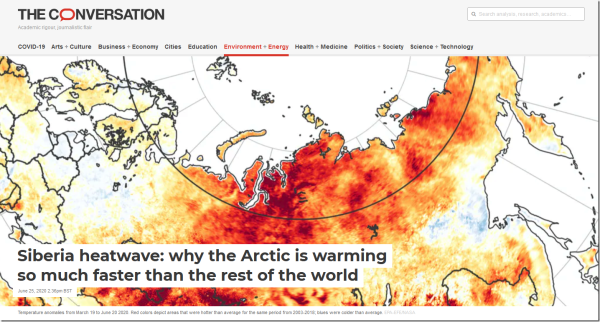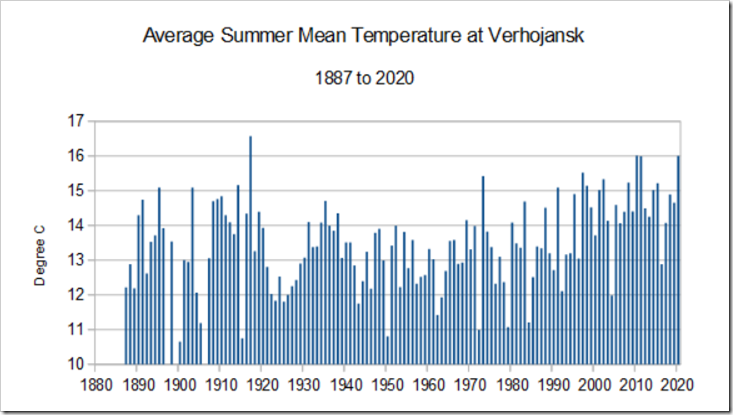“We do not believe any group of men adequate enough or wise enough to operate without scrutiny or without criticism. We know that the only way to avoid error is to detect it, that the only way to detect it is to be free to inquire. We know that in secrecy error undetected will flourish and subvert”. – J Robert Oppenheimer.
Siberian Heatwave? The Summer Of 1917 Was Hotter!
By Paul Homewood
You cannot fail to recall the neurotic freaking out over last summer’s Siberian heatwave, when a new record temperature for the Arctic of 38C was set at Verhojansk:

https://notalotofpeopleknowthat.wordpress.com/2020/06/27/siberian-heatwave-climate-or-weather/
The event was one of last year’s main climate poster children, along with wildfires. Each year, the climate establishment pick on one or two unusual weather events, in an attempt to convince us all that the planet is quickly spinning out of control. To most people, such temperatures are unheard of in the Arctic, as they naturally assume the region is frozen all year round.
As I inconveniently pointed out at the time, the new record of 38.0C was only 0.7C higher than recorded in the same location in 1988.
But that was only one day. Now we have the full data for the year, we can compare temperatures for the whole of the summer at Verhojansk.
Data from NASA GISS confirms that, while it was unusually warm there last year, the hottest summer was actually way back in 1917:
https://data.giss.nasa.gov/cgi-bin/gistemp/stdata_show_v4.cgi?id=RSM00024266&ds=14&dt=1
Summer temperatures at Verhojansk can clearly swing wildly from year to year, depending on meteorological conditions. Last summer brought an extended period of high pressure, delivering sunny weather and a hot airmass from the south.
Other years can bring cold and wet weather from the Arctic Ocean.
It was “weather”and not “climate change” which was responsible for Siberia’s hot summer.


Meanwhile, over in the US, 1917 was the coldest year on record, as was the Spring of that year.
Forgive me if I’m wrong, but I thought the 38 degree reading was very questionable and unlikely to be confirmed? What have I missed?
Don’t let the BBC know that it wasn’t a record.
‘Normal’ for Jan is -41/-48C, -55/-56C today, lows of -62C forecast in next few days.
Just the weather pendulum!
NTZ on Arctic ‘warming’. Says pretty much what we’ve all pointed out before.
https://notrickszone.com/2021/01/13/arctic-temps-show-little-change-over-past-90-years-in-sync-with-oceanic-surface-temperature-cycles/
High temperatures are quite common in the Eurasian Arctic summer. Temperatures over 34 Celsius have been recorded at Tiksi (latitude 71 degrees north) on the edge of the Laptev Sea, and over 36 Celsius at Khatanga (similar latitude) at the eastern base of the Taymyr Peninsula. It is worth noting that the Verkhoyansk record occured on 20 June with 24 hour insolation, and also that Verkhoyansk is noted for its extremes, both hot and cold enhanced by its situation.
BBC inviting comment in an on line survey
https://www.bbc.co.uk/send/u61149175
enjoy…. if you want to pass comment on wall to wall climate and covid scaremongering
Done!
In their ‘submission received’ email, they say: “We’ll keep it for up to 270 days – and if we don’t use it we’ll then delete it and any other information you sent us.
We really appreciate your help to understand what you think and feel about the BBC.”
I have a feeling they won’t be keeping mine!
I bet they don’t get the chance to change/alter/massage/dicredit that record! But I bet they try.
It wasn’t even “one day”, it was simply one moment. The “day” may not have been the hottest – it might have been colder to start with and then got colder quickly after the high temperature. Using Tmax as the temperature for a period is simply wrong.
O/T Effect of lockdown on air pollution in UK.
Some may remember the discussions we had on this topic regarding the situation in the UK, puzzled at the claims of miraculously cleansed air – which did not seem to be very obvious in the actual monitoring station data.
Other research has already agreed that PMs did not decrease significantly, increased even, in the period after traffic almost disappeared overnight from UK roads.
This new paper also suggests that in London, after the traffic vanished, ozone increased by 26%, and NO2 decreased by only 10%, with -2% and -8% respectively due to lockdown.
https://wattsupwiththat.com/2021/01/13/first-lockdowns-effect-on-air-pollution-was-overstated-our-study-reveals/
London has a lot of highly polluting buses and taxis and as I thought with the Marylebone Road data, the pollution was mostly related to those and not private cars – they returned at different times/rates, the pollution only really increased after the bus/taxi movements increased again. That small -8% in NO2 is likely mostly not due to cars.
It is now obvious that a total ban on private ICE cars in London (and elsewhere) will not make any significant different to air quality and private motorists have been unfairly and politically targeted. Air quality in the UK is already extremely good, with massive improvements in recent decades, and ICE car emissions standards are extremely high.
History suggests the globe will continue to warm on and off until the next ice age starts, so expect more cherrypicking of short-term weather events as evidence of…well, nothing really.
In 1917 the Thames froze in London, reported the Dailey telegraph. People had problems acquiring coal. There was a rumpus about 45 cwt of the stuff being sent to a museum while others were in fuel poverty.
Coal ships used to pull up on the beach near me, after a storm you can find lost coal washed up or uncovered, some chunks are the size of a football.
Here is my work on the Verkhoyansk thing for what it’s worth.
https://tambonthongchai.com/2020/07/19/agw-heat-wave-in-siberia/
My main point there is that time and geography constrained temperature events do not have a global warming interpretation.
For that one must look at the global warming data
These data are over long time spans and the temperature data are for large geographical regions that are significant portions of the globe.
https://tambonthongchai.com/2021/01/11/global-warming-dec2020/